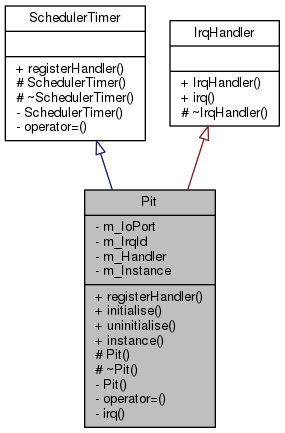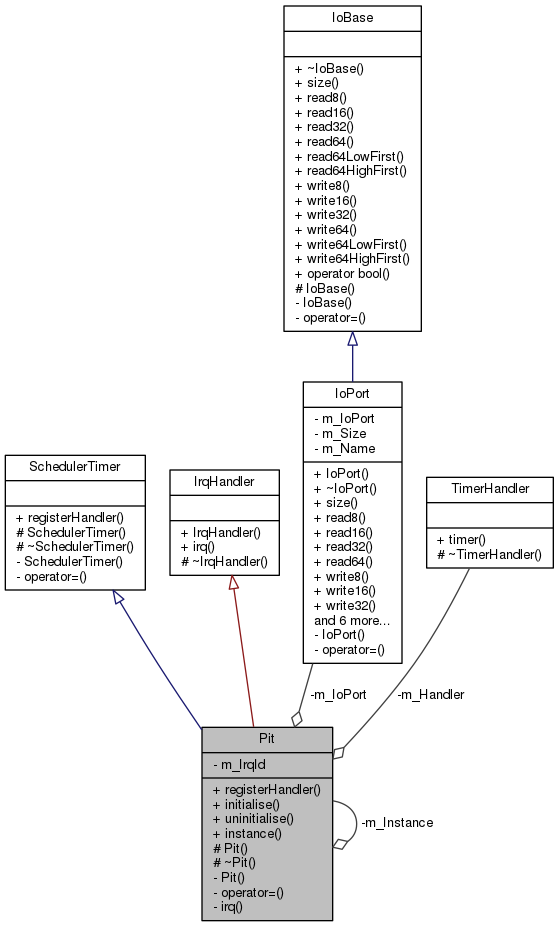#include <Pit.h>
 Inheritance diagram for Pit:
Inheritance diagram for Pit: Collaboration diagram for Pit:
Collaboration diagram for Pit:Public Member Functions | |
| virtual bool | registerHandler (TimerHandler *handler) |
| bool | initialise () INITIALISATION_ONLY |
| void | uninitialise () |
Static Public Member Functions | |
| static Pit & | instance () |
Protected Member Functions | |
| Pit () INITIALISATION_ONLY | |
| virtual | ~Pit () |
 Protected Member Functions inherited from SchedulerTimer Protected Member Functions inherited from SchedulerTimer | |
| SchedulerTimer () | |
| virtual | ~SchedulerTimer () |
Private Member Functions | |
| Pit (const Pit &) | |
| Pit & | operator= (const Pit &) |
| virtual bool | irq (irq_id_t number, InterruptState &state) |
| virtual | ~IrqHandler () |
Private Attributes | |
| IoPort | m_IoPort |
| irq_id_t | m_IrqId |
| TimerHandler * | m_Handler |
Static Private Attributes | |
| static Pit | m_Instance |
Detailed Description
The programmable interval timer implements the SchedulerTimer interface
Constructor & Destructor Documentation
|
protected |
The default constructor
Definition at line 91 of file Pit.cc.
Referenced by instance(), and ~Pit().
 Here is the caller graph for this function:
Here is the caller graph for this function:
|
inlineprotectedvirtual |
|
private |
The copy-constructor
- Note
- NOT implemented
Member Function Documentation
| bool Pit::initialise | ( | ) |
Initialises the class
- Returns
- true, if successful, false otherwise
Definition at line 45 of file Pit.cc.
References IoPort::allocate(), m_IoPort, m_IrqId, IrqManager::registerIsaIrqHandler(), and IoPort::write8().
Referenced by Pc::initialise(), and instance().
 Here is the caller graph for this function:
Here is the caller graph for this function:
|
inlinestatic |
Get the Pit class instance
Definition at line 40 of file Pit.h.
References INITIALISATION_ONLY, initialise(), m_Instance, Pit(), and uninitialise().
Referenced by Pc::getSchedulerTimer(), and Pc::initialise().
 Here is the caller graph for this function:
Here is the caller graph for this function:
|
privatevirtual |
Called when the handler is registered with the irq manager and the irq occurred
- Note
- If this function returns false you have to call IrqManager::acknowledgeIrq() when you removed the interrupt reason.
- Parameters
-
[in] number the irq number
- Returns
- should return true, if the interrupt reason was removed, or false otherwise
Implements IrqHandler.
Definition at line 95 of file Pit.cc.
References LIKELY, m_Handler, and TimerHandler::timer().
Referenced by ~Pit().
 Here is the caller graph for this function:
Here is the caller graph for this function:The assignment operator
- Note
- NOT implemented
Referenced by ~Pit().
 Here is the caller graph for this function:
Here is the caller graph for this function:| void Pit::uninitialise | ( | ) |
Uninitialises the class
Definition at line 76 of file Pit.cc.
References IoPort::free(), m_IoPort, m_IrqId, and IrqManager::unregisterHandler().
Referenced by instance().
 Here is the caller graph for this function:
Here is the caller graph for this function:Member Data Documentation
|
private |
|
staticprivate |
|
private |
The PIT I/O port range
Definition at line 78 of file Pit.h.
Referenced by initialise(), and uninitialise().
|
private |
The documentation for this class was generated from the following files:








 1.8.11
1.8.11